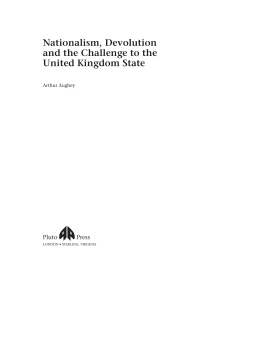
Additional Information
Book Details
Abstract
With the advent of devolution, it is clear that the British Constitution is currently undergoing a period of dynamic transformation. England, Ireland, Scotland, and Wales were slowly united by conquest and treaty over the last 300 years, a unity which was only broken by the 1922 agreement that split Ireland in two. The last 50 years have seen the collapse of empire, and while the pull of local nationalism within the United Kingdom continues to strengthen, integrative narratives of Britishness weaken.
In this insightful book, Arthur Aughey outlines the changing character of the United Kingdom polity, and examines the developing debate about the meaning of the Union in the context of New Labour/New Britain.
In a systematic survey of historical, theoretical and political reflection on the nature of Britishness, he questions what the Union once was, what it means now and what it might become, taking into account the challenge posed by internal divisions along with the problems posed by European integration and globalisation.
'Logically structured, convincingly argued, and richly exemplified. An important contribution to the debate about the future of Britain'
Ethnopolitics
Table of Contents
| Section Title | Page | Action | Price |
|---|---|---|---|
| Contents | v | ||
| Preface | vii | ||
| PART I Questions | 1 | ||
| 1 When Was Britain? | 3 | ||
| A Question of Nomenclature | 5 | ||
| A Question of British History | 9 | ||
| A Question of Amnesia | 12 | ||
| Forging the Nation? | 15 | ||
| 2 What Was Britain? | 21 | ||
| The Paradox of British Politics | 24 | ||
| Contract and Solidarity | 37 | ||
| The Genteel Tradition | 32 | ||
| 3 Why Is Britain? | 41 | ||
| Posing the Question | 41 | ||
| The Empire | 45 | ||
| The Constitution | 49 | ||
| Fatal Anxiety | 52 | ||
| Pragmatism and Redemption | 54 | ||
| Duality | 56 | ||
| PART II Narratives | 63 | ||
| 4 The Conservative Nation | 65 | ||
| The Making of the Conservative Nation | 68 | ||
| Constitutional Consequences of Margaret Thatcher | 74 | ||
| After Thatcher | 80 | ||
| 5 The Labour Nation | 85 | ||
| Labour and the Nation | 87 | ||
| The Social Democratic State | 90 | ||
| Old Labour and Devolution | 92 | ||
| New Labour's Nation | 95 | ||
| Rebranding Britain | 101 | ||
| British Matters | 102 | ||
| 6 National Peoples | 105 | ||
| Hobsbawm | 107 | ||
| Hobsbawm's Critics | 109 | ||
| Questions of Degree | 112 | ||
| Wales | 115 | ||
| Scotland | 119 | ||
| PART III Futures | 125 | ||
| 7 Modes of Self-Determination | 127 | ||
| Northern Ireland | 128 | ||
| Scotland | 138 | ||
| Wales | 146 | ||
| 8 Missing England | 153 | ||
| Englishness and Britishness | 155 | ||
| Simon Heffer's England | 158 | ||
| Billy Bragg's England | 162 | ||
| The Genteel Tradition of Englishness | 165 | ||
| English Questions | 167 | ||
| 9 A European Conclusion? | 171 | ||
| Identity | 171 | ||
| Sovereignty | 173 | ||
| Legitimacy and Self- Government | 176 | ||
| After Britain? | 180 | ||
| References | 183 | ||
| Index | 203 | ||
| Act of Union [1707] | 18 |
